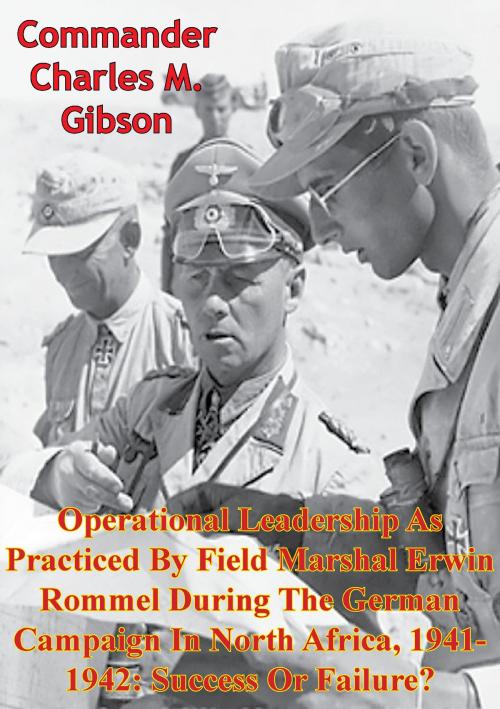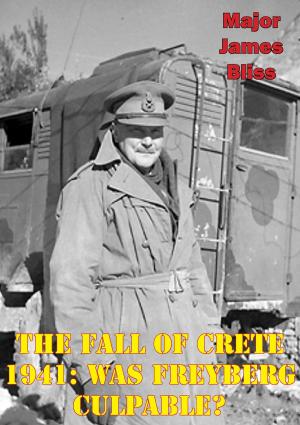Operational Leadership As Practiced By Field Marshal Erwin Rommel During The German Campaign In North Africa, 1941-1942
: Success Or Failure?
Nonfiction, History, Germany, European General, Military, United States| Author: | Commander Charles M. Gibson | ISBN: | 9781782897255 |
| Publisher: | Lucknow Books | Publication: | August 15, 2014 |
| Imprint: | Lucknow Books | Language: | English |
| Author: | Commander Charles M. Gibson |
| ISBN: | 9781782897255 |
| Publisher: | Lucknow Books |
| Publication: | August 15, 2014 |
| Imprint: | Lucknow Books |
| Language: | English |
The Germans entered the North African theater to alleviate pressure on the Italians and prevent the collapse of the Italian Fascist regime. Rommel arrived in North Africa, and despite orders to establish a blocking force, immediately went on the offensive with the objective of forcing the Allies out of North Africa. After two years of fighting, Rommel and his forces were defeated.
This paper analyzes the operational leadership of Field Marshal Erwin Rommel during the North African campaign of 1941-1942. It concludes that Rommel, despite being an accomplished tactical leader, was a poor operational leader. Rommel lacked the proper personality, military education, and military experience to obtain the broad view necessary to become a successful operational leader. His personal relationship with Hitler put Rommel in a position of authority he was not qualified to fulfill. Additionally, his inability as an operational commander to fully comprehend logistics and strategic objectives resulted in the German’s defeat in North Africa.
The Joint Force Commander must ensure his operational commanders are more than just tacticians. A successful tactical leader will not automatically become a successful operational leader. Close scrutiny of potential operational commanders is a must to ensure the future leaders of the U.S. military will be able to accomplish military strategic and operational objectives.
The Germans entered the North African theater to alleviate pressure on the Italians and prevent the collapse of the Italian Fascist regime. Rommel arrived in North Africa, and despite orders to establish a blocking force, immediately went on the offensive with the objective of forcing the Allies out of North Africa. After two years of fighting, Rommel and his forces were defeated.
This paper analyzes the operational leadership of Field Marshal Erwin Rommel during the North African campaign of 1941-1942. It concludes that Rommel, despite being an accomplished tactical leader, was a poor operational leader. Rommel lacked the proper personality, military education, and military experience to obtain the broad view necessary to become a successful operational leader. His personal relationship with Hitler put Rommel in a position of authority he was not qualified to fulfill. Additionally, his inability as an operational commander to fully comprehend logistics and strategic objectives resulted in the German’s defeat in North Africa.
The Joint Force Commander must ensure his operational commanders are more than just tacticians. A successful tactical leader will not automatically become a successful operational leader. Close scrutiny of potential operational commanders is a must to ensure the future leaders of the U.S. military will be able to accomplish military strategic and operational objectives.



![Cover of the book Contemptible [Illustrated Edition] by Commander Charles M. Gibson](https://www.kuoky.com/images/2015/november/300x300/9781786251114-fijE_300x.jpg)


![Cover of the book The Note-Book Of An Attaché - Seven Months In The War Zone [Illustrated Edition] by Commander Charles M. Gibson](https://www.kuoky.com/images/2014/august/300x300/9781782894827-qbjO_300x.jpg)





![Cover of the book Temporary Crusaders [Illustrated Edition] by Commander Charles M. Gibson](https://www.kuoky.com/images/2014/august/300x300/9781782893097-kcFH_300x.jpg)


![Cover of the book 21 Army Group: Normandy To The Baltic [Illustrated Edition] by Commander Charles M. Gibson](https://www.kuoky.com/images/2015/november/300x300/9781782897613-Vvwo_300x.jpg)